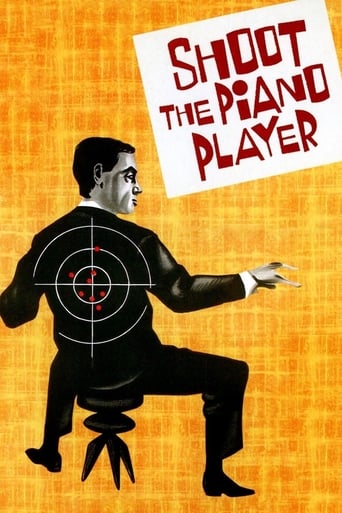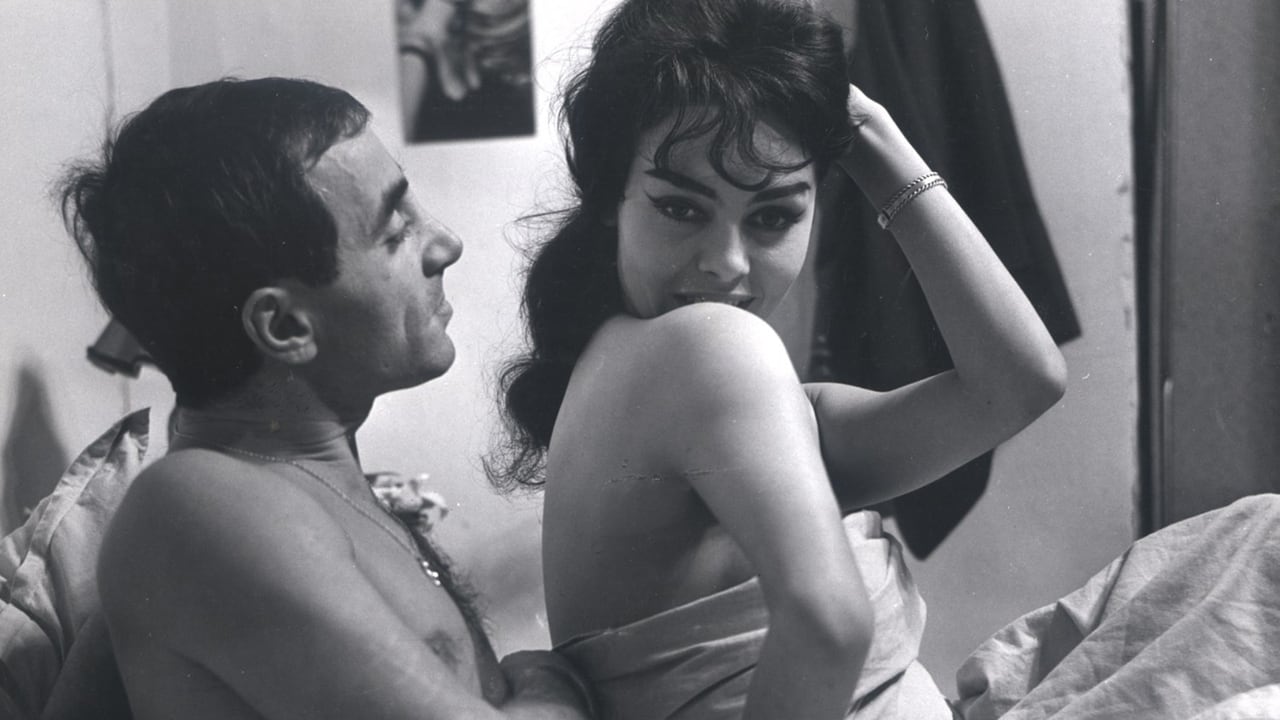melvyn-z
Tragic, unconventional, non-chronological told love story in which the protagonist Charlie loses two girlfriends under fateful circumstances, partly caused by him. The occasionally funny and always entertaining film transform the American novel Down There and it's noir atmosphere into a french masterpiece that exposes the "romance and beauty between the lines" (Kael in a different context). It centers around the titular piano player who's shyness, love for women and art, as well as his final powerlessness reflect not only the writer and director Truffaut, but also our own lives. It's his second picture and maybe with the, partly failed, exception of Jules and Jim his last real attempt at the Godard-esque deconstruction of film and his genres, after which he leaned more, and sometimes too much so, to the classical approach of his great idol Hitchcock. Nevertheless do I admire Truffauts more grounded style, which fits his striving for succession of Renoirs humanistic legacy. In Shoot the Piano Player the combination between youthful experimenting with genre and form, and the not quite polished attempt at an effective emotional drama, perfectly fit the story to create a masterpiece.
seymourblack-1
"Shoot The Piano Player" is an enormously entertaining movie that utilises a variety of different styles, moods and sudden changes of pace to tell the story of a piano player whose attempts to achieve contentment in obscurity are thwarted by the actions of his criminal brother. This was Francois Truffaut's second movie and at the time of its making, he was clearly on a creative high, as what's seen on screen looks like the delirious outpourings of a mind that was totally passionate about filmmaking and also brimming over with ideas.Truffaut's love of movies started at an early age and provided him with some respite from his very troubled childhood. As a young man he, like most of the well known New Wave directors, became a contributor to the film journal "Cahiers du Cinema" and together, they advocated a more informal approach to filmmaking with greater use being made of footage that was shot outside of the studios. The type of films that had captivated the young Truffaut were predominantly American B-movies and it was because of his great respect and affection for them that he made "Shoot The Piano Player".Charlie Kohler (Charles Aznavour) is a pianist in a small but lively Parisian bar who finds that his regular routine is thrown into chaos when his older brother Chico (Albert Remy) seeks his help because he's being pursued by a couple of gangsters. It transpires that Chico and another brother, Richard (Jean-Jacques Aslanian), had worked together with Momo (Claude Mansard) and Ernest (Daniel Boulanger) on a heist but had double crossed them when they took off with most of the loot.Charlie leads a quiet life looking after his youngest brother Fido (Richard Kanayan) and is helped in this by his good natured neighbour Clarisse (Michelle Mercier) who's a prostitute and also occasionally, his mistress. Helping Chico leads to trouble for Charlie when he and his girlfriend Lena (Marie Dubois) get kidnapped at gunpoint by Momo and Ernest, but fortunately, they manage to escape when Ernest's bad driving leads to him being stopped by the police.Lena is a waitress at the bar where Charlie works and tells him that she knows about his past. Charlie had been a very successful concert pianist (known by his real name, Edouard Saroyan) but had given up his career after his wife Therese (Nicole Berger) had committed suicide. Tragically, she had taken her own life because she'd confessed to Charlie that the first big break in his career had come as a result of her agreeing to sleep with his impresario. Charlie's inability to come to terms with what she'd done had been more than she could bear.After Charlie kills his boss in self-defence, trouble continues to follow him until events ultimately reach a climax during a shoot-out in a countryside location.Charlie is a tragic and sensitive character who's a victim of fate. Not only had his career, which had elevated him to a new level of success, ended suddenly with the result that he'd ended up back in the type of environment that he'd originally emerged from, but also his love affairs with Therese and Lena both ended in tragedy and heartbreak.There's a great deal that's melancholic and poignant about Charlie's story but the way in which it's told is often comical, irreverent and disconcerting because of the use of unorthodox styles of editing and pacing. This juxtaposition of humour and pathos could be regarded as a reflection of the normal balance of life which often leads to humorous things happening at times of great sadness or it could simply be what happens when someone who's so intoxicated by the possibilities of his art form gives his creativity free rein.The quality of the acting in this movie is consistently good but Charles Aznavour's performance is positively exceptional. His facial expressions and body language are perfect and convey Charlie's vulnerability and innate sadness so well that it would be hard to imagine anyone else being able to improve on what he achieved in this role.
Atreyu_II
After the great 'The 400 Blows', Monsieur Truffaut made this cool film with a peculiar title - a title which, by the way, I like. Curiously, the pianist is portrayed by a real-life musician: the great Charles Aznavour. However, the rest of the cast is about as great when it comes to acting abilities.Despite the title, there is really very little of action. But hey, you can't expect a movie this old to have "exciting" levels of action like the modern movies. This is "old-school" action, when action was limited but authentic and even the noises were realistic, nothing to do with the almost deafening sounds of nowadays. Who needs those excesses? Deep down, this classic isn't limited to just one genre, being a successful but modest combination of different genres which works. Besides, few movies transform tense scenes into humorous scenes the way this does.I really like the beating of the piano melody by Georges Delerue. Cinematography is quite decent and permits us to appreciate french streets and other places, a Truffaut specialty. I consider this one of Truffaut's best films, after 'The 400 Blows' and 'The Wild Child', and better than the interesting but flawed 'Jules et Jim'.This should definitely be on Top 250.
jotix100
Charlie Kohler, a pianist at a Parisian dive, lives in obscurity. As the story begins, he is visited by one of his brothers, Chico, who is being followed by two gangsters that want to talk to him about the money he took from them. Naturally, Charlie becomes also a target for these characters who figure they can get to Chico through his brother.A loner, Charlie lives alone with his younger brother Fido. His neighbor is an attractive prostitute, Clarissa, that hangs around in the place where Charlie plays. Lena, a shy woman that also works there, likes Charlie. The attraction is there but neither Charlie or Lena make the right move to consummate what they feel for one another. We watch them go into the empty Parisian streets late at night but nothing happens between them, until Clarissa points to her friend that Lena cares for him.As Charlie and Lena begin to get intimate, Charlie thinks about another life he had with Therese. He was an aspiring the classic concert Edoard Saroyan, an artist with a fine future. What he is not aware of is the sacrifice Therese underwent in order to get him into the spotlight. The impresario Lars Schmeel, he learns, knew Therese in more intimate ways. Her sacrifice was what took Edoard to a fame that was, in part, due not to his talent, but as someone's desire to possess something that was his. Therese pays dearly for her actions.The gangsters finally get to Charlie by kidnapping Fido after school and taking him to the place where Chico and Richard Saroyan are hiding. Knowing that Clint, the bar tender's betrayal proves fatal as Charlie wants to avenge his telling his brother's chasers about their whereabouts. Lena, borrows the landlady's car to go after the criminals; in the end, Charlie stands alone as Lena is killed during a shootout.The second film by Francois Truffaut was a memorable one. Not having seen it for quite some time, we took a chance to do so when it showed up on a classic film channel recently. The film appears to have been restored with care. We loved Raoul Coutard's brilliant black and white cinematography. Taking the camera to the streets was a trade mark of the New Wave filmmakers, Truffaut accomplishes an incredible atmosphere by the tour he gives us of those out of the way places of Paris where he sets the action. The film is based on a novel by David Goodis. A lot of French creators saw in this native American pulp writing a good source in which to base their work.Charles Aznavour plays the double role of Charlie/Edoard with an economy of gestures. Yet, both men being portrayed in the film show this man could have been a natural for the cinema, had he decided to take more roles instead of a splendid career as a singer. Marie Dubois, Nicole Berger, and Michelle Mercier are seen as Lena, Therese and Clarissa, respectively. Albert Remy was excellent as Chico.



 AD
AD



